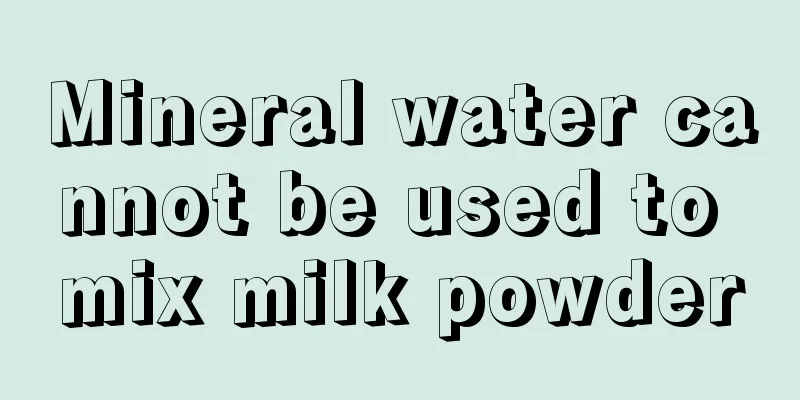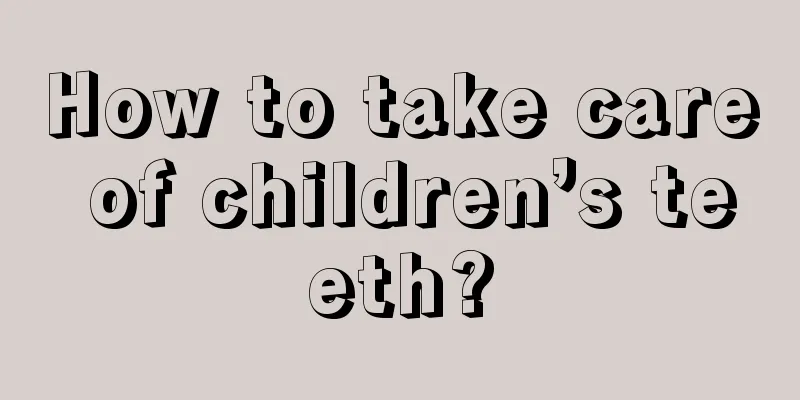Mineral water cannot be used to mix milk powder

|
Recently, there have been media reports that mineral water cannot be used to prepare infant formula. The reason is that the minerals contained in mineral water are for adults. If infants drink it in large quantities for a long time, it will increase the burden on the kidneys and may also cause problems such as indigestion, loss of appetite and constipation. Does mineral water really harm the health of babies? What kind of water should be used to make milk powder for babies? Water for milk powder More important for infants under 6 months old First, we need to distinguish between babies of different ages. For infants and young children over six months old, although some of their organs are not fully developed, they are not that fragile. Moreover, babies at this age have already started to eat complementary foods. Regardless of whether it is breast milk, formula milk or complementary foods, the nutrient content is not constant, but varies within a certain range. Babies themselves also have a certain tolerance range for changes in the content of various minerals in food. Therefore, as long as the drinking water meets sanitary conditions and the mineral content is not too high, it can generally be used to make formula for babies. Just avoid drinking bitter mineral water with extremely high mineral content. For infants under six months old, milk is their only source of nutrition. Whether you are breastfeeding or formula feeding, you do not normally need to drink additional water. At this time, the water used to make milk powder is relatively important. Therefore, the following content is also mainly for infants under six months old. Bottled or tap water Different standards abroad Parents abroad have the same question about what kind of water to use to mix milk powder. The European Food Safety Authority issued a hygiene recommendation on how to prepare milk powder in 2005, which included a paragraph on how to choose the water to use for preparing it. Considering the sanitary conditions of drinking water in the EU, they believe that it is not necessary to boil the water. For preparing formula at home, it is recommended that tap water be used if its mineral content meets the standards for bottled water suitable for infants. At the same time, you also need to pay attention to letting the water flow for a few seconds after turning on the faucet before connecting it, and only use cold water, not water from hot water pipes, because the water temperature in the pipes exceeds 25 degrees Celsius, which may increase the content of microorganisms and minerals in the water. In addition, the faucet and the surrounding environment should be cleaned regularly. It is not recommended to use tap water filtered by a water filter pitcher or other household water filtration devices, as this may cause the microbial content in the water to exceed the standard. If the above requirements cannot be met, the European Food Safety Authority recommends using bottled water to mix milk powder. Bottled natural mineral water or spring water suitable for babies will do. When suitable drinking water or bottled water is not available, consider using boiled and cooled water. So, what indicators should bottled water suitable for babies meet? The French Food Safety Agency issued relevant key indicator requirements in 2003. For a bottled water to qualify as suitable for infants, in addition to meeting the hygiene standards for drinking water, it must also meet a series of indicators ranging from mineral content, heavy metal content to microbial indicators and even packaging materials. For example, it is required that (not all) sulfate content shall not exceed 140 mg/L, calcium content shall not exceed 100 mg/L, magnesium content shall not exceed 50 mg/L, and fluoride content shall not exceed 0.5 mg/L. At the same time, the French Food Safety Agency also believes it is necessary to remind consumers that long-term and excessive consumption of tap water with a sulfate content exceeding 140 mg/L and a fluoride content exceeding 0.5 mg/L will pose risks to infant health. Of course, there are different voices. For example, the UK National Health Service (NHS) recommends on its website that unless the local water source is polluted or you are traveling abroad and the local water source is not suitable for drinking, you should not use bottled water because bottled water is not sterilized and may contain too much sodium and sulfate. They recommend that if you use bottled water, you need to make sure the sodium content is less than 200 mg/L and the sulfate content does not exceed 250 mg/L, and whether you use bottled water or tap water, you must boil the water at at least 70 degrees Celsius. When using bottled water, read the nutrition label and do not use filtered water from the community. As for the domestic situation, let’s first take a look at what national standards these types of water follow. The tap water we usually talk about is drinking water. The corresponding national standard is GB5749-2006, which mainly limits some indicators such as microorganisms, heavy metals, and some minerals. The standard stipulates that the total dissolved solids content shall not exceed 1000 mg/L and the sulfate content shall not exceed 250 mg/L. Bottled or barreled drinking purified water is required to be made from water that meets the standards for drinking water and is obtained by removing other substances from it through appropriate methods. It can be considered as water that contains almost no other minerals. The corresponding national standard is GB17324-2003. The mineral water that people usually drink must comply with the national standard GB8537-2008 for drinking natural mineral water. Mineral water does not need to meet the mineral content restrictions for drinking water, and the mineral content of different mineral waters may vary greatly. Considering China's vast territory, the quality of tap water in different regions may vary greatly. Therefore, it is difficult to say in general whether tap water is suitable for making milk powder. If the local tap water is hard and contains a lot of minerals, and you have no way of knowing the specific mineral content, it might be more appropriate to use bottled water. If you use tap water, be sure to boil it first and let it cool before use. If you want to use bottled water, you can choose according to the mineral content marked on the specific product label. For example, you can combine the standards of France and the United Kingdom and choose qualified products from large brands with sulfate content not exceeding 140 mg/L, calcium content not exceeding 100 mg/L, magnesium content not exceeding 50 mg/L, fluoride content not exceeding 0.5 mg/L, and sodium content less than 200 mg/L. This will not affect the health of the baby. In addition to too many minerals, some parents are also worried that purified water lacks minerals and is not good for the health of babies. In fact, there is no need to worry about this at all. Infant formula already contains enough nutrients to meet the needs of infants, and minerals are no exception. Therefore, it is completely acceptable to use qualified purified water to mix milk powder, and it will not cause malnutrition in the baby. As for the water that the community filters itself or the large barrels of water sold in the community whose sources are unclear, it is best not to use it to make baby milk powder for safety reasons. If you want to use it, be sure to boil it first. |
<<: Children who eat too well will grow slower
>>: Four daily recipes for children: mung bean and sweet potato soup to improve immunity
Recommend
How is Mycoplasma pneumoniae infection treated?
Mycoplasma pneumoniae infection is a disease caus...
What to do if a nine-year-old child coughs
Many children have weak resistance and often suff...
What are the common causes of nose bleeding in children?
Nasal bleeding occurs in many children, usually f...
Is roseola infantum contagious?
Roseola infantum is a viral disease, so it is oft...
Is it caused by brain hypoxia when the baby stretches hard?
If a mother encounters difficulties or other symp...
Tips for getting rid of acne in middle school
For junior high school students, because they hav...
Causes and treatment of bloody stools in children
Babies are the apple of every parent’s eye and th...
Why is there foam in the stool of newborns?
The stomach and intestines of newborns are relati...
Symptoms of vomiting and dehydration in children
If a child vomits, parents must pay attention. Th...
How to deal with a baby who has a fever and keeps crying
Baby fever is a very common problem. Moreover, ma...
What to do if a child cannot digest what he eats
We all know that when children are young, their o...
The child's lower lip suddenly swells
If the child's lower lip is swollen, parents ...
What are the early education methods for 7 month old babies?
When the baby is seven months old, he can do some...
What to do if your two and a half year old baby doesn't like to eat
The health of the children is the biggest wish of...
Should newborns sleep with pillows?
Pillows are very important sleeping tools in peop...









